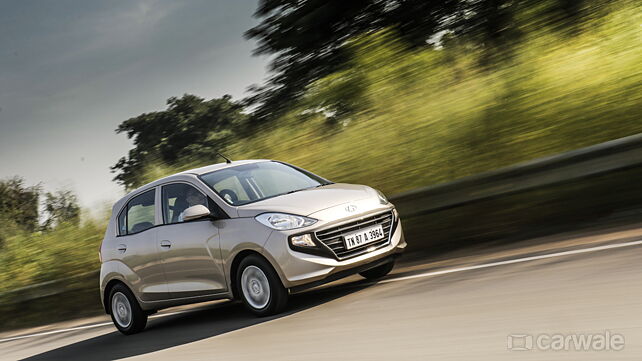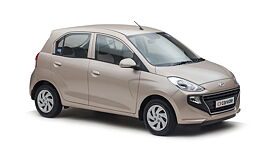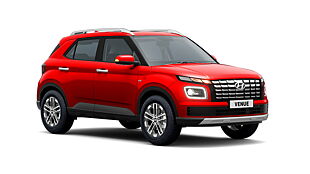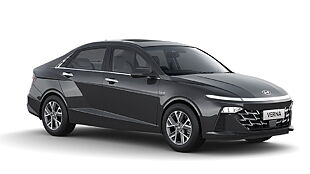What is it?

Why will I buy the Santro?
Easy to drive nature, interior fit and finish, spacious cabin
Why will I avoid it?
Bouncy high speed ride, noisy engine, odd driving position

What is it?
Although this new Hyundai small car carries the well-known Santro brand name, it is essentially a replacement for the now defunct i10. It sits in between the Eon and the Grand i10 and will go up against the Tata Tiago and the Maruti Celerio.
As far as looks are concerned the new Santro is a bit of a mixed bag. Upfront the teardrop headlamps and the shapely bumper looks attractive. But the black cladding on the front bumper looks too big and it reminds us of Heath Leger from Batman asking us why so serious! In profile, Hyundai has concentrated more on function over form. As a result it doesn't look very attractive. The Boomerang shaped creases upfront and at the back does add a bit of flair for an otherwise plain silhouette. The fact that you don’t get alloy wheels even on the top-end Asta variant is a big omission in our opinion. From the rear, the Santro looks muscular thanks to the flared rear-wheel arches and the deep crease on the boot section. The tail-lamps look attractive too and the bumper with black cladding makes the car seem wider than it is.
Although at first glance it might look like it is based on the old i10, the new Santro is actually underpinned by a heavily modified version of the Grand i10 chassis.

How is it on the inside?

Step inside the cabin of the new Santro and you are greeted by an ambiance that feels upmarket and more expensive than you expect in a car at this price. The dash design is simple but is ergonomically spot-on with all the controls falling to hand easily. Elements like the sporty instrument cluster and the turbine shaped side air-con side vents lends it style. The highlight of the dashboard though is the high-res seven-inch touch screen infotainment system which is easily the best-in-segment. It comes with Apple CarPlay, Android Auto and Mirror-link smartphone connectivity, which again, a segment first. It is the same system found in the more expensive Grand i10. As a result, the touch sensitivity is really good and big icons make it easy to navigate. What helps further is the high placement of the screen which falls in your eye-view, and again makes it easy to use on the move. It is easy to get in and out of the Santro thanks to the high seating.

The front seats are well contoured and despite them being slim, the cushioning is good and is a comfortable place to be in. The driving position, though, is not great especially if you are a tall person. The steering is placed too low and as it lacks seat height and steering adjust. Which is why it is difficult to find a driving position that is comfortable especially over long journeys. At the back, you get best-in-class knee-room (6cm more than the Celerio and 9cm more than the Tiago), and even the generous width makes for a decent five-seater. The bench itself is comfortable with good thigh support and good backrest angle. However, what would have made it even better are adjustable headrests as the fixed ones are too small, and won’t help avoid whiplash injuries in case of a rear impact. Also, the fact that Hyundai is providing rear ac vents as a first-in-segment feature adds to the comfort.

The 235-litre boot is at par with the competition but the loading lip is a bit too high and the fact that the rear parcel shelf isn’t strung by the boot lid makes the opening too narrow and loading big bags is a chore.
When it comes to equipment, the Santro like all Hyundai’s, comes well loaded. The top-of-the-line Asta comes with a seven-inch touchscreen infotainment system that’s both Apple CarPlay and Android Auto compatible. You also get stuff like reverse parking sensors, reversing camera, key-less entry, power windows and a full-fledged trip computer. The automatic version of the Santro isn’t available in this top variant, and it misses out on stuff like reversing camera, passenger side airbag, vanity mirror an, rear wiper. As compared to the competition the Santro doesn’t get things like alloy wheels and seat height, or steering adjust.

How does it drive?

The new Hyundai Santro is powered by the same 1.1-litre Epsilon engine as the old i10. But thanks to different tuning, it makes more power and torque than before. It comes mated either to a five-speed manual or a five-speed automated manual gearbox. We got to sample the five-speed manual version. Start this 1.1-litre motor and it settles down to a quiet and vibe-free idle. There’s loads of torque from the word ‘go’, and the Santro moves forward from stand-still with enthusiasm. This strong bottom-end power also means that the Santro can be driven in a higher gear at a very low speeds. As a result, you end up shifting a lot less than in the Tata Tiago or the Maruti Celerio, which is a boon while driving in traffic or while overtaking on the highway. Even when you do have to shift gears, the light clutch and the smooth-shifting gearbox makes it an easy affair. It is a free-revving engine too, but past 3000rpm it gets noisier and therefore sounds harsher near the red-line. As a result, this engine feels best when you upshift early and use the strong torque of this engine.

As far as ride is concerned, the Santro does a good job of smothering small to medium potholes, but, anything bigger and the suspension tends to thud through them. Where the ride at low speeds is decent, at high speeds the Santro feels a bit unsettled. Especially at the rear and over imperfect road surfaces, where it never feels settled and it can get a bit uncomfortable especially for rear passengers. The rear suspension also tends to get caught-out by sharp potholes or expansion-joints, which in-turn jolts the rear passengers. Straight-line stability, though, is impressive as the Santro felt stable even when you go well past three-digit speeds. Even the steering is direct and it weighs up quite well as you go faster.

Should I buy one?
The Hyundai Santro is a very likable car and has a lot going for it. As compared to the competition, it offers extra interior space, more modern features, great interior fit and finish, a torquey petrol engine and comfortable seating. It’s not perfect though. Although it is a brilliant city runabout, it isn’t that great on the highway as the high-speed ride is bouncy, engine gets noisy when worked hard, there is lot of wind and tyre noise seeping through, and the driving position isn’t the best as you don’t get steering or seat-height adjust. As this car is going to be predominantly driven in the city, these drawbacks aren’t really deal-breakers. The new Santro is a well-rounded product that is well priced and makes for a good first car.

Where does it fit in?
The Hyundai Santro is priced between Rs 4.66 to 6.45 lakh. It goes up against the likes of the Tata Tiago which retails between Rs 4.19 and Rs 6.78 lakh, and the Maruti Celerio which costs from Rs 5.08 to Rs 6.43 lakh (All prices on-road Mumbai).

Pictures by Kapil Angane
Update

We also drove the AMT version of the Santro which comes in the lower Sportz variant. The 5-speed automated manual transmission is one of the best we have come across as it feels smooth and relatively quick most of the times. According to Hyundai, this AMT system is developed in-house and they have focused on making it as smooth as possible and it shows. Once you shift the gear selector in D-mode, the Santro creeps forward albeit after a short pause. Part-throttle upshifts are smooth and even downshifts are smooth with minimum jerks. Even when you are in a hurry, this gearbox works really well with quick downshifts (by AMT standards). In our opinion what really helps this basic gearbox feel smooth, is the engine fueling. Where in other AMT shod cars engine revs drop as the gearbox makes a shift, in the Santro it maintains the engine RPM which in turn makes the gearshifts smooth with minimum loss in momentum. We will know how this will affect fuel economy once we put the all-new Santro through our rigorous road test.

































